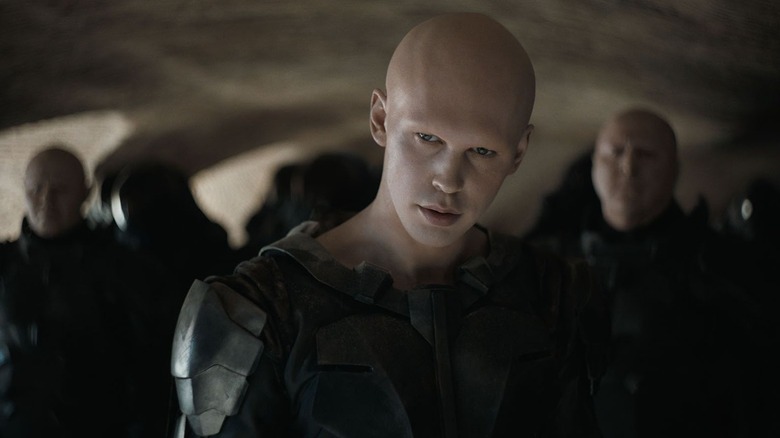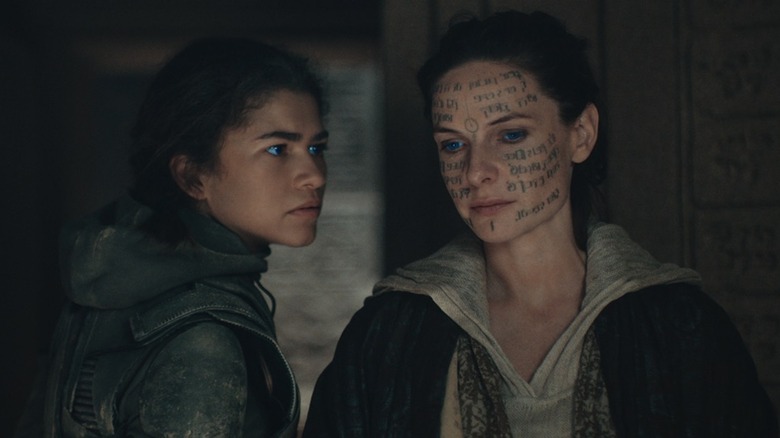Frank Herbert's Son Provided Input On Denis Villeneuve's Dune Script
After writing his magnum opus, "Dune," Frank Herbert penned several science-fiction books, including 1986's "Man of Two Worlds," written in collaboration with his son, Brian Herbert. Although much more contained in scope and ambition than his "Dune" saga, "Man of Two Worlds" delved into the intriguing premise of human and alien minds, and how beautiful and disastrous it would be if one body were to house these warring identities. The collaboration between the two authors birthed a fascinating if somewhat shaky foundation for a world that could have been, weaving fantasy and satire into a story that feels both dense and nostalgic. Brian's involvement in his father's work is not limited to this — he kept the "Dune" legacy going by piecing together prequels and sequels based on his father's notes, penning companion pieces such as "Legends of Dune" and "Sandworms of Dune" over the years.
When the Herbert estate learned of Denis Villeneuve's interest in adapting "Dune," Brian was intrigued by the director's interest. However, according to Tanya Lapointe's stunningly crafted "The Art and Soul of Dune," Brian "decided not to contact him directly" as a studio was not involved at that point. However, after the estate signed a deal with Legendary Pictures in 2016, Villeneuve was officially brought on board — a decision Brian wholeheartedly agreed with. The stakes were high, as the Herbert estate reiterated that they wished to endorse an adaptation that preserved the ethos of Frank Herbert's saga and Villeneuve seemed like the perfect choice for such a daunting undertaking.
After Villeneuve brought screenwriter Eric Roth to help mold the initial creative process, Roth exchanged lengthy emails with Brian and met him shortly after to discuss the film's vision. This was the beginning of a steady collaboration between Brian and the creative team of "Dune."
Preserving the heart of Frank Herbert's Dune
As the Herbert estate cared deeply about the saga's legacy, Brian Herbert was delighted after Roth wrote him a detailed email about how much "Dune" meant to him personally and the film's vision that was spearheaded by Villeneuve. "Eric assured me that he loved Frank Herbert's masterpiece and that he and Denis intended to closely adhere to my father's story," the author recalled. He went on to talk about the meetings that he had with Roth regarding "the cinematic potential" of telling a tale about destiny, the hero's journey, and how these tropes get subverted in unexpected fashion within a dystopian world.
In the earliest stages of script writing, Villeneuve decided to split the original "Dune" book in half to make way for a more meaningful, sprawling saga, and the creative team decided that the first movie would end with Paul's fateful meeting with the Fremen. Brian Herbert and his associates were involved with the script and worked closely to nudge the director's vision closer to Frank Herbert's book. This collaborative back-and-forth birthed a rich, intriguing screenplay that both adhered to the novel's ethos and diverted from it in meaningful ways. The journey was not smooth though; both "Dune" and its sequel, "Dune Messiah," are labyrinthine works that sport minute explorations of power, inter-galactic politics, and how these aspects affect the interior lives of their characters.
Apart from incorporating recommendations from the Herbert estate, Villeneuve also worked closely with screenwriter Jon Spaihts ("Prometheus") to help condense the book's heady mythology into something more accessible. "It had a grand romance and intelligence I hadn't encountered before in a book. It felt legitimately profound," said Spaihts. In the end, years of creative efforts by various artists contributed to "Dune: Part One," the first installment in Villeneuve's glorious adaptation of a literary masterwork.

